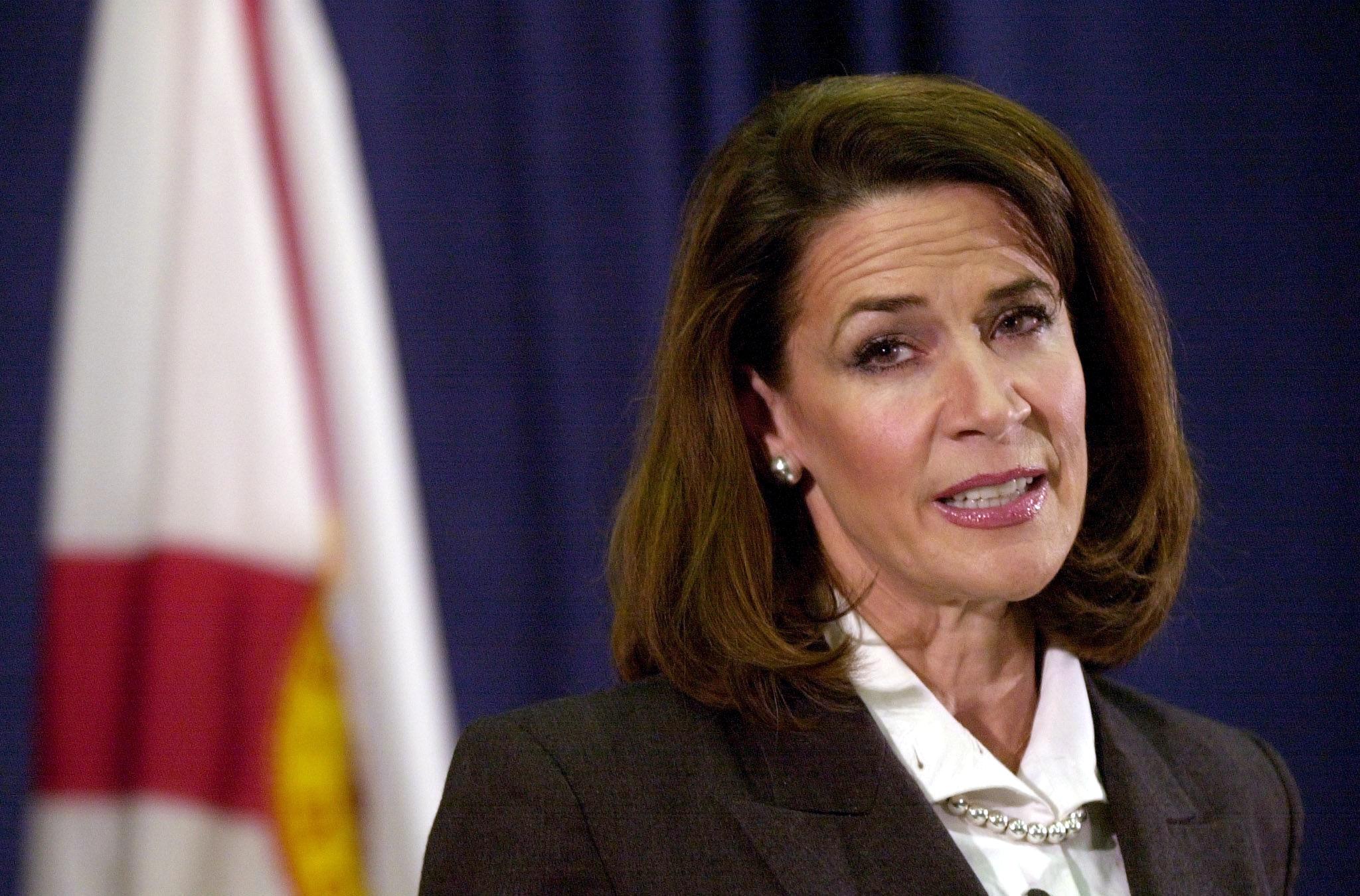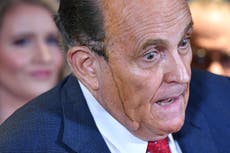Katherine Harris, the controversial face of the Bush-Gore recount, on how history is repeating itself this election
Florida’s secretary of state was firmly in the firing line during the 2000 Bush v Gore recount. She tells Harriet Alexander that she sees echoes, even if the politics is different, this time around

Katherine Harris says she will tell "a funny story".
It's about death threats, but when you have been through what she has, a little gallows humour is to be expected. "I was getting ready to go into my first press conference," says Ms Harris, a trenchant Republican, recalling her time as secretary of state of Florida - in charge of elections and suddenly in the eye of the political storm as Bush v Gore erupted on her watch.
"And I know people think, oh, politicians, they know how to speak in front of a camera. Well, as a senator I had some press conferences, maybe you get three cameras. Going into my first press conference, it just seemed like, I don't know, some spy movie. All these millions of cameras.
"When I opened the door, the chief of police said to me: 'Don't worry about the death threats and burning down your house. We have it under control.'
"And I closed the door and said: 'What?!'"
Ms Harris laughs. She says she had no idea of the violent passions that the 2000 election had inflamed. Her staff had wanted to wait until after she made her speech - "I went out there, and probably looked like a deer in the headlights," she recalled.
Ms Harris, now 63, says she does not miss being on the frontlines any more.
It is hardly surprising: for 36 days the world was glued to events unfolding in her office, as a recount was held which ultimately made George W. Bush the president.
Her every move was subject to vicious scrutiny: she was mocked for her makeup, nicknamed the "dragon lady", and labelled "the Richard Nixon of Florida politics".
A former aide to Bill Clinton, Paul Begala, called her Cruella de Vil; The Washington Post's style critic cattily suggested she had been "taking styling cues from Versace ads in which models are made up as if by a mortician's assistant."
In the 2008 film Recount, Laura Dern played her - Dern, a self-described liberal, said she had "never had so much fun in my life" in the role.
Ms Harris admits the mockery hurt.
"There has always been political bantering back and forth," she told The Independent, speaking from her beachfront Sarasota home. "If they want to mock me on Saturday Night Live, so be it.
"I do not have thick skin. I get my feelings hurt very easily. But I really wanted to serve and I'm grateful for the opportunity I had."
Twenty years on, a similar situation is playing out.
Donald Trump is challenging the election, and the secretaries of state in Georgia, Philadelphia, Wisconsin and Arizona find themselves in the spotlight. Both Brad Raffensperger, the Republican secretary of state of Georgia, and Katie Hobbs, the Democrat secretary of state for Arizona, have received death threats.
It is a feverish environment, and one which Ms Harris remembers only too clearly.
"I empathise completely," she said. "I guess the only way I felt safe was to be in quarantine against all the political actors.
"It's been written that I had a ‘war room’ in the department of state. We laughed so much at that. I had two antiquated computers and a communications person who had been involved in me in my races, but never had any interaction with the Bush campaign. And we had our lawyers.
"This wasn't a bunch of political operatives sitting around the table. This was just the department of state, and the employees we hired.
"And the reason was that there was this madness out there - the TV cameras everywhere, I had death threats, I had 24 hour security, I had some outrageous things occur. But at the end of the day my safe harbour was following the law."
She admits that she was surprised to find herself swept up in the chaos, 20 years ago.
Born into a wealthy landowning family in Key West, she grew up in Bartow, the granddaughter of Ben Hill Griffin, a citrus-grower and state legislator who was one of the state's largest landowners.
She attended an all-women's college in Georgia, Agnes Scott, and later earned a master's degree in public administration at Harvard. She studied art and Spanish in Madrid, and then received a fellowship to study art and philosophy in Geneva.
Ms Harris said she was raised as a Democrat.
"I never met a Republican until I was 18, and I thought they were odd," she said. "I interned in Washington DC for Democrats in the House and Senate. When I moved to Sarasota the majority were Republicans, and I switched. But I never intended to be in public office, ever."
While she was secretary of state, Jeb Bush was governor, but she strongly rejects the idea that she "served under" his government: her independence, she says, was vital. She did campaign for George W. Bush in New Hampshire, however, and was honourary co-chair of his Florida campaign; one of many co-chairs in the state, she points out.
"The reality of being so close to the Bushes, that was just a press fabrication," she said.
She is adamant that she simply followed the Florida laws, repeating multiple times that she knew she would have to live with herself for the rest of her life.
Ms Harris says she was able to keep a clear head because she kept her distance from the political hullabaloo around her.
"After the first three days, when it was such a morass, I shut my doors and said no one can come into my office - no one from the governor's office, no political operatives, period," she said. "If you want to talk law, you can talk to the lawyers. But you cannot come into my office and influence me."
Asked what she makes of Lindsey Graham, the staunchly pro-Trump senator for South Carolina, calling the secretary of state of Georgia, she demures.
Mr Graham insists it was merely to help him understand the methods for verifying signatures. Mr Raffensperger alleges that Mr Graham pressured him to discard legally-cast ballots. Democrats are calling for Mr Graham to resign.
"I couldn't comment on that," she says. "All I can say is we stayed focused on the law.
"And I don't know the context of those conversations or anything else. I really don't like to express an opinion when I don't have any understanding of what transpired."
Ms Harris said that more states should have learnt the lessons from Florida, which this year was the poster child for voting efficiency.
"Florida is not a red or blue state. It's a purple state. And we will always have close elections," she said.
"So when New York and Chicago and California journalists want to make fun of us, that's fine, but they don't have a diverse electorate.
"They had the opportunity to look to Florida but it's really hard to learn a lesson until you have had a problem. And, quite frankly, sometimes there might be states whose political leadership wants to be able to play with those ballots."
It was an undeniably bruising time for Ms Harris.
When she stepped down, she ran for the US Senate and won the Republican primary, but in November 2006 was solidly defeated by the incumbent, Senator Bill Nelson, a Democrat.
She does not regret her time on the electoral frontlines, though.
"If someone could say here's a magic wand, we can erase it and you don't have to go through it - I wouldn't allow that," she said.
"I feel quite blessed and fortunate that I had to handle that situation. And I know I operated with integrity.
"I can live with myself the rest of my life."
Perhaps unsurprisingly for her politics, she now sides with the vast majority of Republicans saying Mr Trump’s legal challenge should be allowed to play out.
"Instead of everyone rushing and being excited or concerned, take a breath and let it work through the process," said Ms Harris.
She adds that Mr Biden is not yet president-elect - despite the fact that Mr Trump was named president-elect after winning the 2016 election by a similar margin.
So after 14 December, does she believe the US will have a president-elect?"If indeed states can certify, because they are not being held up by what is considered a legitimate lawsuit that could change the votes," she said.Join our commenting forum
Join thought-provoking conversations, follow other Independent readers and see their replies
Comments


Bookmark popover
Removed from bookmarks